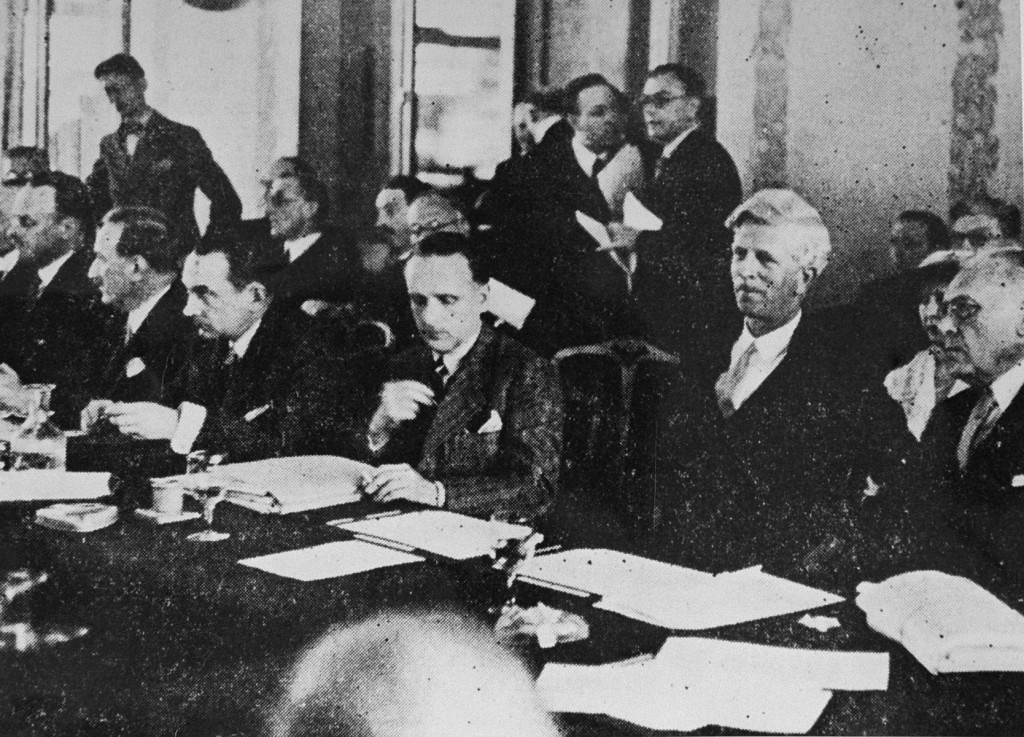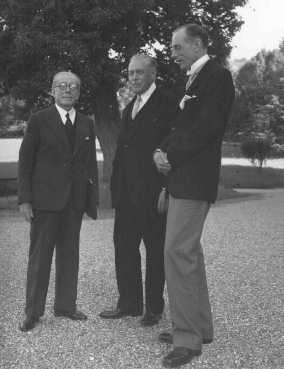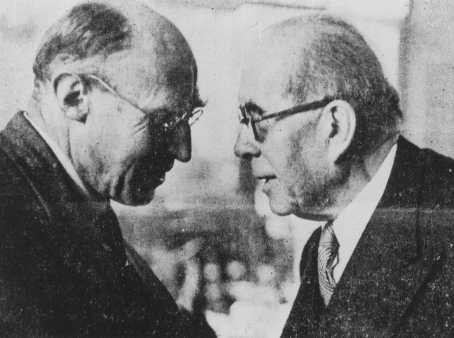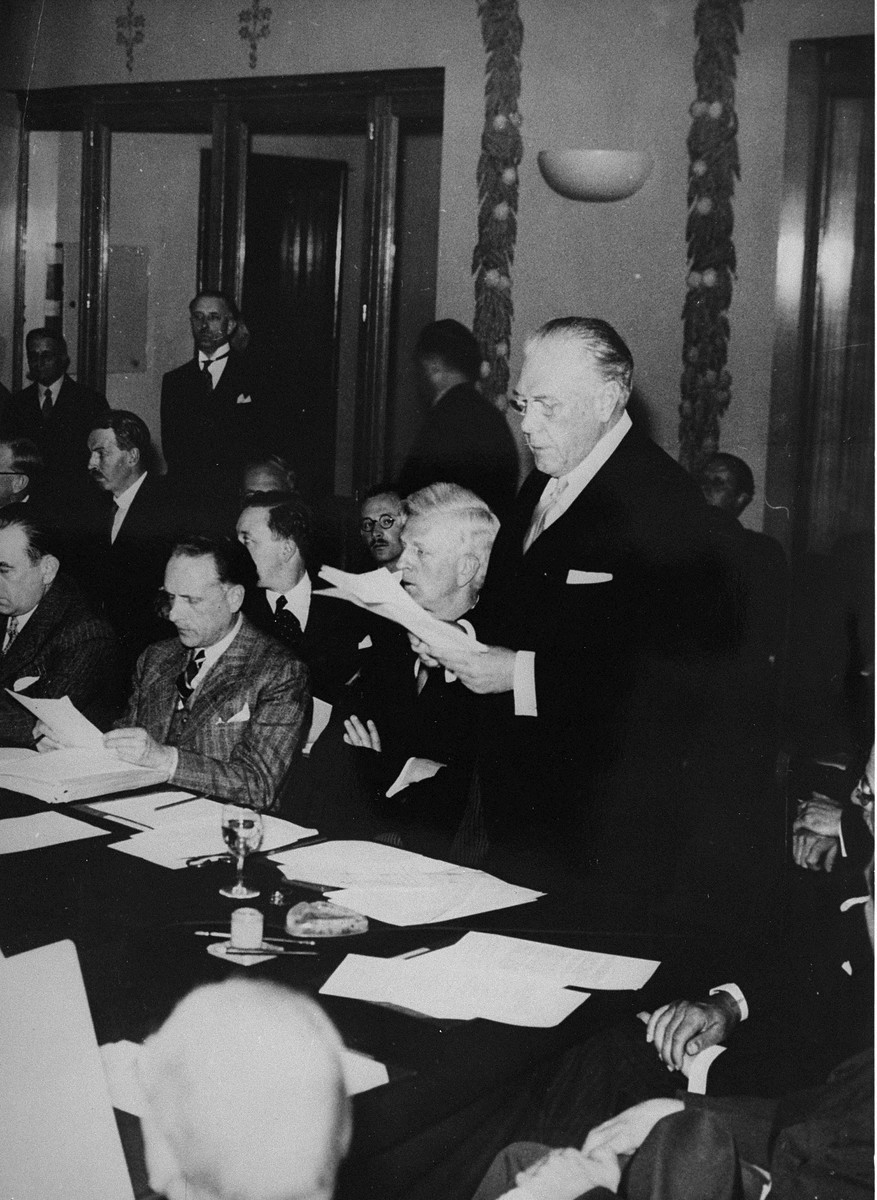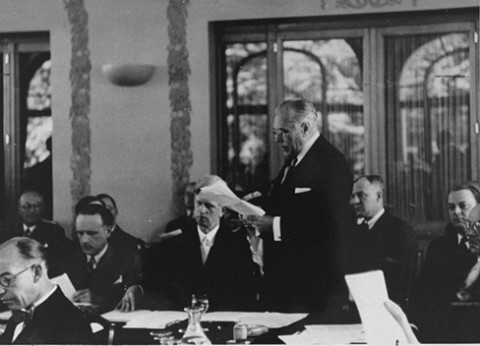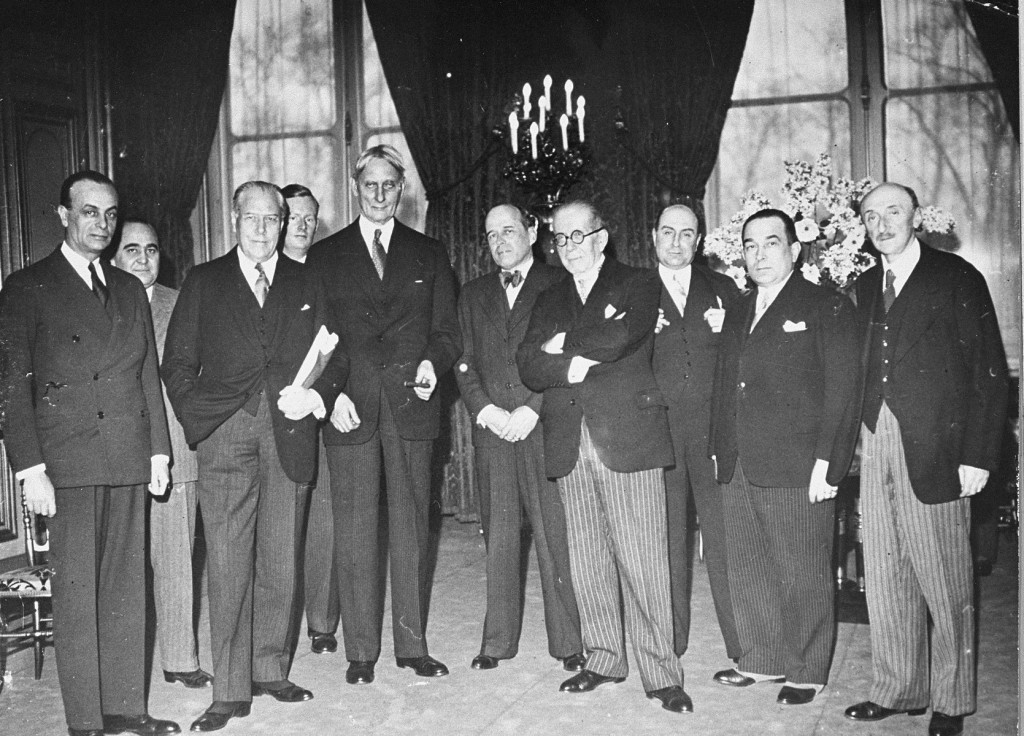
Emigration and the Evian Conference
In July 1938, a conference of nations met at Evian, France, to discuss the issue of Jewish refugees fleeing persecution in Nazi Germany and trying to enter other countries. The Evian Conference had very little impact on the plight of the refugees.
Key Facts
-
1
Before World War II, Nazi policy sought to drive Jews out of Germany and Austria by subjecting them to increasing persecution and violence, but other countries were unwilling to take in large numbers of Jewish refugees.
-
2
The United States convened the Evian Conference, but, like the other participating countries, refused to change its immigration policies to help more refugees.
-
3
Although the majority of German and Austrian Jews managed to flee Nazi Germany, many of those who went to other European countries died in the Holocaust after Germany occupied those countries.
Between 1933 and 1941, the Nazis sought to make Germany judenrein (cleansed of Jews) by making life so difficult for the 525,000 German Jews that they would be forced to leave their country. By 1938, about 150,000 German Jews had already left. After Germany annexed Austria (the Anschluss) in March 1938, however, an additional 185,000 Jews came under Nazi rule.
Increasing persecution and public displays of cruelty and violence following the Anschluss persuaded many German and Austrian Jews that they should emigrate. It was difficult for them to find countries willing to take them in, however, especially since the Nazi regime did not allow them to take most of their assets out of the country. A substantial percentage tried to go to the United States but were unable to obtain the necessary immigration visas. The US Congress had established immigration quotas through the Immigration Act of 1924 (also known as the Johnson-Reed Act or the National Origins Act). The quotas sharply limited the number of immigrants from certain countries and discriminated against countries whose populations were considered racially or ethnically undesirable.
Following the Anschluss, President Franklin D. Roosevelt called for an international conference that would discuss the plight of refugees seeking to flee Nazi Germany and establish an international organization to work for an overall solution to the refugee problem. In early July 1938, delegates from 32 countries and a number of non-governmental aid organizations met at the French resort of Evian on Lake Geneva. Roosevelt chose Myron C. Taylor, a businessman and close friend, to represent the United States at the conference.
During the nine-day meeting, delegate after delegate rose to express sympathy for the refugees. But most countries, including the United States and Great Britain, offered excuses for not letting in more refugees. Only the Dominican Republic agreed to accept additional refugees. This offer came as President Rafael Trujillo sought both to rehabilitate his reputation following his government's massacre of Black Haitians in 1937 and to bring white wealth into his country. Commenting on the Evian Conference, the German government gleefully noted how "astounding" it was that foreign countries criticized Germany for its treatment of the Jews, yet none of them opened their doors.
The conference attendees did create the Intergovernmental Committee on Refugees (ICR), charged with approaching "the governments of the countries of refuge with a view to developing opportunities for permanent settlement" and seeking to persuade Germany to cooperate in establishing "conditions of orderly emigration." The ICR received little authority and virtually no funds or other support from its member nations. Its achievements were minimal before September 1939, when the beginning of World War II largely ended all efforts.
Although the events of Kristallnacht (often referred to in English as the “Night of Broken Glass”) in November 1938 were widely reported in graphic detail, 71% of Americans responding to a public poll at that time opposed changing immigration quotas to allow in more Jewish refugees. Even efforts by some Americans to rescue children failed: the Wagner-Rogers Bill, a 1939 proposal to admit 20,000 endangered Jewish refugee children over two years, was not supported by the Senate.
The US government did adopt measures to ensure that refugees received the maximum number of visas allowed under the quotas, but it could not change the quotas without the approval of Congress. There were several reasons the American public and Congress opposed increasing the number of Jewish refugees allowed to enter the country. The US economy experienced a recession in 1937–1938, with unemployment rising to 20%, so immigrants who arrived without assets were viewed as unwelcome competitors for scarce jobs and burdens on public services. Isolationism was another factor at a time when tensions were mounting in Europe, since most Americans opposed involvement in foreign issues not directly threatening their security. There were also claims that Nazi Germany was embedding spies and saboteurs among the refugees. Antisemitism influenced American public attitudes toward Jewish refugees as well, particularly antisemitic stereotypes of Jews as war-mongers and rabble-rousers who would undermine the nation’s security and way of life.
Despite the failure of the Evian Conference, there was a significant increase in Jewish emigration from Nazi Germany between 1938 and 1940, so that more than 60% of German and Austrian Jews were able to flee. The United States took in more than 100,000 Jewish refugees by 1940, more than any other nation in the world. However, tens of thousands of Jews who tried to flee were unable to find a refuge before the Nazi regime implemented the “Final Solution” policy, which led to the death of more than 230,000 German and Austrian Jews. In addition, 100,000 Jewish refugees fled to European nations that were overrun by Nazi Germany during the war, and a significant portion of those refugees died in the Holocaust.
Critical Thinking Questions
What pressures and motivations may have driven decisions by the delegates at the Conference? Investigate how countries explained their unwillingness to increase emigration.
Why was the conference convened? Did the results address the stated goals of the conference?
What obligations, if any, do other countries have to accept refugees of any kind? Is there a special obligation if their lives are endangered? Investigate if currently nations are enforcing or relaxing their regulations when refugees are threatened today.



